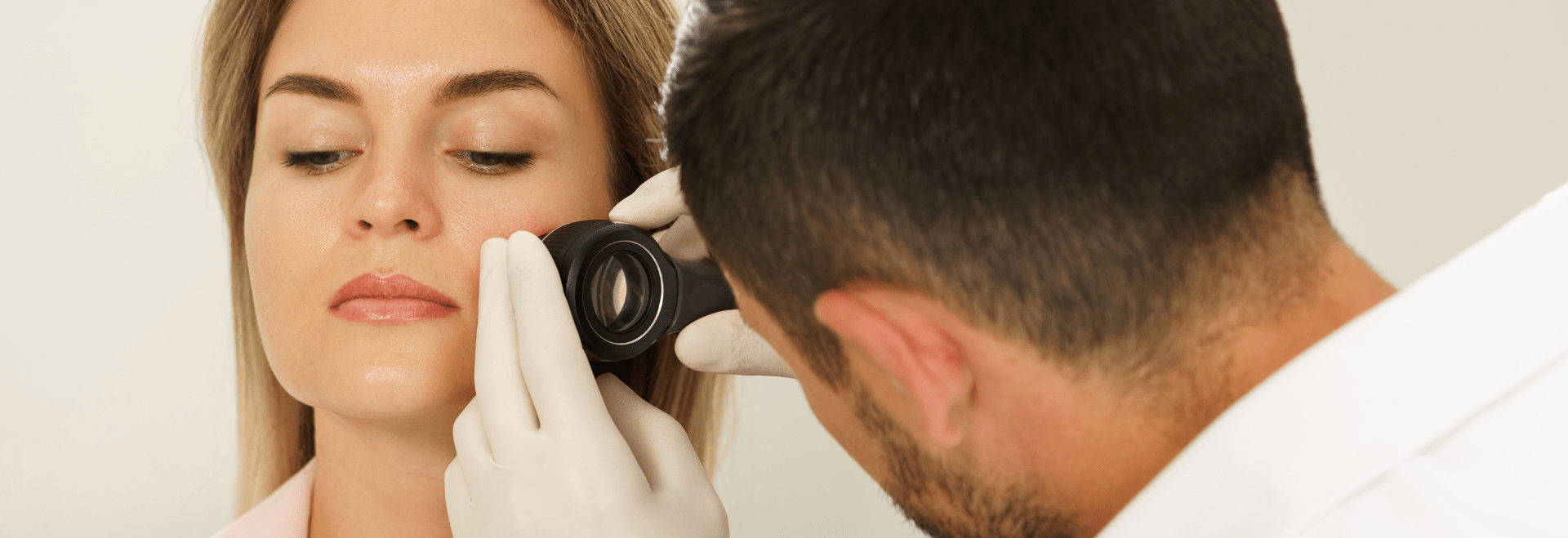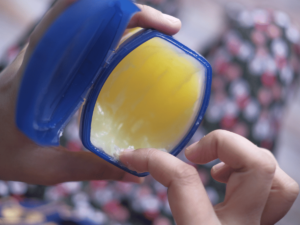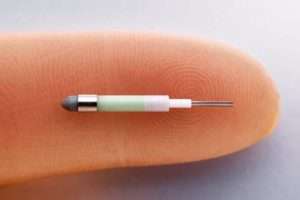If you or a loved one is facing the prospect of Mohs surgery on the nose, you’re likely seeking information and reassurance about this specialized procedure. Mohs surgery is a good treatment for common types of skin cancer like basal cell carcinoma and squamous cell carcinoma. It’s named after Dr. Frederic Mohs.
This precision-focused surgery is particularly useful for treating areas where conserving healthy tissue is crucial, such as the nose.
The nose, with its complex structure and prominent position on the face, requires a careful approach when it comes to skin cancer treatment.
Mohs surgery stands out for its ability to meticulously remove cancerous cells while sparing as much healthy tissue as possible. This makes sure that cancer cells are completely removed and reduces scarring while keeping the nose’s function and appearance.
In this guide, “Mohs Surgery on Nose: Everything You Need to Know,” we aim to provide a thorough overview of the process. You’ll learn about why Mohs surgery might be recommended for nasal skin cancer, what you can expect during the procedure, and how to prepare for your surgery. We’ll also cover important aspects of post-operative care and what to expect during healing.
Whether you are in the early stages of considering Mohs surgery or are already preparing for your procedure, this guide is designed to offer clarity and confidence as you move forward.
Understanding the Need for Mohs Surgery on the Nose
Mohs surgery is not just a medical procedure; it’s a targeted response to a specific medical need, especially when it involves sensitive areas like the nose. Understanding why Mohs surgery is recommended for nasal skin cancers is crucial in your healthcare journey.
Why Mohs Surgery for the Nose?
- Precision and Effectiveness: The nose is a challenging area due to its intricate shape and the visibility of any scarring. Mohs surgery offers a precise technique to remove cancerous cells layer by layer, ensuring that only the affected tissue is removed and as much healthy tissue as possible is preserved.
- High Cure Rates: For certain types of skin cancer, especially basal cell and squamous cell carcinoma, Mohs surgery has shown high cure rates, making it a preferred choice for facial areas.
Suitability for Mohs Surgery
- Type of Skin Cancer: Mohs surgery is particularly effective for treating basal cell carcinoma and squamous cell carcinoma on the nose.
- Size and Depth of Cancer: This technique is well-suited for cancers that have unclear boundaries or have recurred after previous treatment.
- Preserving Cosmetic Appearance: Given the nose’s prominent position, preserving cosmetic appearance is a key consideration, and Mohs surgery is adept at achieving this.
Advantages Over Other Treatments
- Minimized Scarring: By targeting only cancerous cells, Mohs surgery reduces the amount of healthy tissue removed, leading to smaller scars.
- Immediate Microscopic Examination: The immediate examination of tissue during the procedure ensures a higher chance of complete cancer removal during a single visit.
- Reduced Recurrence Rates: The thoroughness of Mohs surgery leads to lower recurrence rates for skin cancers.
Consultation with a Specialist
- Before proceeding with Mohs surgery, a detailed consultation with a dermatological surgeon or a Mohs specialist is crucial.
If you visit us at Dermatology of Seattle, we will evaluate your skin cancer during the consultation and discuss whether Mohs surgery is suitable for you. Additionally, we will address any questions or concerns you may have.
Preparing for Your Mohs Surgery: Steps and Guidelines
As you approach your Mohs surgery on the nose, preparation is key. Being well-prepared can not only ease your anxiety but also contribute to a smoother procedure and recovery. This section outlines important steps and guidelines to help you prepare for your upcoming Mohs surgery.
Understanding the Procedure:
- Take time to understand what Mohs surgery involves. Knowing the step-by-step process can help reduce anxiety and set realistic expectations.
Pre-Surgery Consultation:
- Schedule a pre-surgery consultation with your Mohs surgeon. Use this opportunity to ask questions, understand the risks and benefits, and discuss your medical history.
Medication and Health Review:
- Inform your surgeon about all medications and supplements you are taking. Some medications may need to be paused or adjusted.
- Discuss any existing health conditions that could affect the surgery or recovery.
Arranging Transportation and Post-Care:
- Arrange for someone to drive you home after the surgery, as you might be under the influence of sedation or feel discomfort.
- Consider arranging for help at home if needed, especially in the first few days post-surgery.
Preparing Your Home for Recovery:
- Set up a comfortable recovery area at home. Include items you might need within easy reach, such as medications, water, and a phone.
The Night Before Surgery:
- Follow any specific instructions given by your surgeon. This may include washing the surgical area with a specific type of soap or fasting if sedation is planned.
- Get a good night’s sleep to help your body prepare for surgery and recovery.
Day of Surgery:
- Wear comfortable clothing that does not need to be pulled over your head.
- Avoid wearing makeup, jewellery, or any hair accessories that might interfere with access to the surgical site.
- Have a light meal if you are not required to fast.
Mental Preparation:
- Mental preparation is just as important. Consider relaxation techniques, meditation, or simply engaging in your favorite activities to keep your mind at ease.
Post-Surgery Care and Recovery Tips
After undergoing Mohs surgery on the nose, the focus shifts to caring for yourself to ensure a smooth and effective healing process. Post-surgery care prevents complications, minimizes scarring, and promotes quicker recovery. Here are some essential care and recovery tips to follow after your Mohs surgery.
Wound Care:
- Follow your surgeon’s instructions for wound care meticulously. This will likely include keeping the surgical area clean and applying dressings or topical medications as directed.
- Avoid touching or scratching the surgery site to reduce the risk of infection and aid the healing process.
Managing Pain and Discomfort:
- Some pain or discomfort post-surgery is normal. Over-the-counter pain relievers, as recommended by your doctor, can help manage this.
- If you experience significant pain, contact your healthcare provider for advice.
Swelling and Bruising:
- It’s common to experience swelling and bruising around the nose area. Applying a cold compress can help reduce this.
- Keep your head elevated, even while sleeping, to help decrease swelling.
Activity Restrictions:
- Limit physical activities, especially those that could stress the surgery area, for the time recommended by your surgeon.
- Avoid strenuous exercise, bending, or lifting heavy objects during the initial recovery phase.
Sun Protection:
- Protecting your skin from the sun is crucial, especially in the surgery area. Wear a wide-brimmed hat and use sunscreen on the nose once the wound has healed sufficiently.
- Avoid prolonged sun exposure to prevent scarring and promote better healing.
Monitoring for Complications:
- Be vigilant for signs of infection, such as increased redness, warmth, or pus. Contact your doctor if you notice any of these symptoms.
- Keep an eye out for signs of abnormal healing, such as persistent bleeding or unusual changes in the wound appearance.
Nutrition and Hydration:
- A balanced diet rich in vitamins and proteins can aid in the healing process.
- Stay hydrated by drinking plenty of water, which helps maintain skin health and promotes healing.
Follow-Up Appointments:
- Attend all scheduled post-operative appointments. These are crucial for monitoring your healing and addressing any concerns.
Emotional Well-being:
- It’s normal to feel a range of emotions after surgery. If you’re feeling overwhelmed, seek support from friends, family, or professional counselors.
Remember, recovery times can vary from person to person. Be patient with your body as it heals, and don’t hesitate to reach out to your healthcare provider with any concerns.






